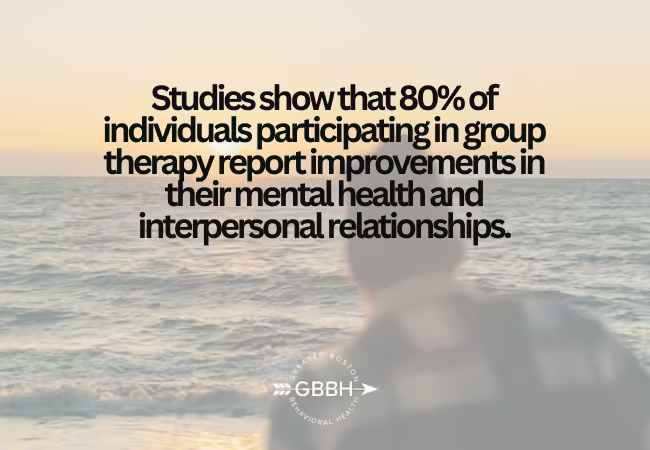Mental health challenges can significantly impact various aspects of life, including relationships, productivity, and overall well-being. Addressing these challenges often requires a nuanced approach tailored to each individual’s needs. One of the most effective strategies is the integration of Group Therapy Programs with Individual Treatment Plans. This combination offers a holistic framework for recovery, addressing both personal and interpersonal aspects of mental health.
At Greater Boston Behavioral Health, we believe in the power of this integrated approach. Our services, including Mental Health Programs, Anxiety Treatment Programs, and Trauma Therapy Programs, are designed to provide individuals with a safe, supportive environment for healing and growth. By combining the benefits of individual therapy with the shared experiences of group therapy, we create a balanced pathway to recovery.
The Importance of Individual Treatment Plans
An Individual Treatment Plan is a personalized roadmap for mental health recovery. It is tailored to address the specific challenges, goals, and needs of each client. This plan typically includes one-on-one therapy sessions where clients work closely with a therapist to explore their emotions, behaviors, and thought patterns.
Key Benefits of Individual Treatment Plans
- Personalized Care:
- Individual therapy allows therapists to tailor strategies to the unique experiences and goals of the client. For example, someone in an Anxiety Treatment Program may focus on managing triggers, while another client in a Depression Treatment Program may prioritize building positive thought patterns.
- Confidentiality:
- Private therapy sessions provide a safe space to discuss deeply personal issues that may be difficult to share in a group setting.
- Focused Goal Setting:
- Clients and therapists collaborate to establish specific, measurable goals, ensuring progress is tracked and celebrated.
- Deep Emotional Processing:
- Individual sessions offer the opportunity to explore past traumas or unresolved conflicts at a comfortable pace, making it an essential component of a Trauma Therapy Program.
While individual therapy offers these personalized benefits, it may not address the broader social and relational dynamics that can influence mental health. This is where group therapy comes in.
The Power of Group Therapy
Group therapy is a cornerstone of effective mental health treatment, offering benefits that extend beyond what individual therapy can achieve. In a group setting, participants share experiences, build connections, and develop new perspectives that can accelerate healing. Guided by a trained therapist, group therapy provides a structured environment for growth and mutual support.
Key Benefits of Group Therapy
- Community and Belonging:
Many individuals struggling with mental health conditions feel isolated. Group therapy creates a safe space where participants realize they are not alone in their challenges. This sense of community fosters trust, understanding, and shared strength. - Learning from Others:
Group members often bring unique insights and coping strategies that others can learn from. Sharing experiences helps participants understand their struggles in new ways, offering practical solutions and emotional validation. - Social Skills Development:
For those with social anxiety or interpersonal challenges, group therapy provides a supportive environment to practice communication, assertiveness, and conflict resolution. - Accountability and Motivation:
Group therapy encourages participants to stay committed to their recovery goals. Witnessing the progress of peers can inspire hope and reinforce the importance of persistence. - Diverse Perspectives:
The diversity within a group offers a range of perspectives, helping participants see their own situations through different lenses and challenging unhealthy thought patterns.
By combining the therapeutic benefits of group settings with individual treatment, participants can achieve more balanced and comprehensive mental health care.
Why Integration is Key
While individual therapy offers personalized attention, group therapy introduces a collective dynamic that enriches the healing process. Integrating these two approaches ensures that individuals receive both the targeted care they need and the relational growth that comes from group interaction.
How Integration Enhances Recovery
- Dual Focus on Personal and Social Growth:
Individual therapy allows clients to explore personal challenges, such as past trauma or specific anxiety triggers, while group therapy emphasizes relational and social skills. This combination addresses the full spectrum of mental health needs. - Reinforcement of Skills:
Coping strategies developed in individual sessions, such as mindfulness techniques or cognitive restructuring, can be practiced and honed in group therapy. This repetition reinforces learning and builds confidence. - Support During Transitions:
For clients moving from intensive care, such as a Partial Hospitalization Program (PHP), to less structured care, group therapy provides continuity and support during a critical transition phase. - Holistic Healing:
Integration ensures that treatment is not just symptom-focused but also addresses interpersonal dynamics, emotional resilience, and community building.
The synergy between individual and group therapy maximizes recovery potential, equipping clients with the tools they need to thrive in all areas of life.
Programs at Greater Boston Behavioral Health
At Greater Boston Behavioral Health, we specialize in integrating individual and group therapy across a range of treatment programs. Our evidence-based and client-centered approach ensures that each individual receives the care they need to thrive.
1. Mental Health Program
- This foundational program supports individuals with a variety of mental health conditions, including anxiety, depression, and trauma. It incorporates individual therapy for personalized care and group therapy to foster connection and shared learning.
2. Anxiety Treatment Program
- Designed to help clients manage and reduce anxiety symptoms, this program combines individual therapy for identifying triggers and group sessions for practicing coping strategies in a supportive setting.
3. Partial Hospitalization Program (PHP)
- The PHP provides intensive, structured care for individuals with acute mental health needs. Clients engage in daily therapy sessions, including both individual and group therapy, creating a comprehensive recovery framework.
4. Intensive Outpatient Program (IOP)
- Ideal for individuals transitioning from higher levels of care or balancing treatment with daily responsibilities, the IOP integrates individual and group therapy to provide consistent support.
5. Trauma Therapy Program
- This program addresses the emotional and physical impacts of trauma. Individual sessions allow clients to process deeply personal experiences, while group therapy offers a safe space to connect with others who have faced similar challenges.
6. Depression Treatment Program
- By combining individual therapy to explore emotional patterns and group therapy to develop social skills, this program helps clients overcome the debilitating effects of depression.
7. Family Therapy Program
- Recognizing the role of family in recovery, this program includes group sessions with family members and individual support for the client. It focuses on improving communication, resolving conflicts, and building a supportive home environment.
8. Anger Management Program
- This program equips clients with tools to identify triggers, regulate emotions, and practice healthier responses. Group settings allow participants to learn from others’ experiences, while individual therapy provides tailored strategies.
Success Stories from Integration
At Greater Boston Behavioral Health, we’ve witnessed the transformative power of integrating group and individual therapy. Here are two examples that highlight the impact of this approach:
Case Example 1: Conquering Social Anxiety
Emma* joined our Anxiety Treatment Program after struggling with intense social anxiety that affected her work and relationships. In individual therapy, she identified her triggers and learned coping strategies such as deep breathing and cognitive reframing. Once she felt more confident, she joined a Group Therapy Program, where she practiced her skills in a supportive environment. Over time, Emma developed the courage to engage in social situations, improving her relationships and career prospects.
Case Example 2: Healing from Trauma
John* enrolled in our Trauma Therapy Program to address unresolved emotional wounds from childhood abuse. Individual therapy provided a safe space to process his past, while group therapy connected him with others who had faced similar experiences. Hearing their stories gave him a sense of validation and hope, while sharing his own experiences helped him reclaim his voice. This dual approach allowed John to move forward with a renewed sense of purpose and resilience.
How to Know if Integrated Therapy is Right for You
Deciding on the best approach to mental health treatment can feel overwhelming, but integrated therapy is often a good fit for individuals seeking comprehensive care. Here are some indicators that this approach may be right for you:
1. You Value Personalized Attention
If you want to explore deeply personal issues, such as past trauma or intense anxiety, individual therapy offers the privacy and focus needed to address them effectively.
2. You Want to Connect with Others
If you feel isolated in your struggles or want to improve your interpersonal skills, group therapy provides a supportive environment to build relationships and share experiences.
3. You’re Navigating Complex Challenges
Integrated therapy is ideal for individuals dealing with multiple mental health conditions, such as anxiety and depression. This approach ensures that all aspects of your mental health are addressed.
4. You’re Transitioning Between Levels of Care
If you’re moving from an intensive program, such as a PHP, to outpatient care, group therapy offers continuity and support during this transition.
5. You’re Looking for Long-Term Strategies
By combining individual insights with group-based skills, integrated therapy provides a well-rounded toolkit for managing mental health challenges in the long term.
Why Choose Greater Boston Behavioral Health?
At Greater Boston Behavioral Health, we are committed to delivering comprehensive care tailored to your unique needs. As a leading Mental Health Treatment Center in Boston, we provide the tools and support necessary for a fulfilling recovery journey.
What Sets Us Apart:
- Expert Team: Our licensed therapists are experienced in evidence-based practices like CBT and DBT.
- Holistic Care: We address both individual and interpersonal aspects of mental health through integrated programs.
- Flexible Options: From PHP to IOP, we offer treatment levels that fit your lifestyle and needs.
Final Thoughts
Mental health challenges don’t have to be faced alone. With the integrated approach of group and individual therapy, recovery is not only possible—it’s achievable. At Greater Boston Behavioral Health, we are here to guide you every step of the way.
Contact us today at (888)278-0716 to learn more about our Mental Health Treatment Program, Group Therapy Program, and other services. Together, we can help you build a brighter, healthier future.
FAQ on Integrating Group Therapy
How does individual therapy complement group therapy?
Individual therapy focuses on personal challenges and tailored strategies, while group therapy addresses social and relational dynamics. Together, they provide a comprehensive approach to mental health care.
What are the benefits of integrating group and individual therapy?
Integration enhances recovery by combining personal exploration with shared learning, reinforcing skills, addressing social dynamics, and providing continuous support.
Who can benefit from integrated therapy?
Integrated therapy is ideal for individuals with anxiety, depression, trauma, or other mental health challenges, as well as those transitioning between treatment levels like PHP or IOP.
What programs at Greater Boston Behavioral Health integrate group and individual therapy?
Programs such as the Mental Health Program, Trauma Therapy Program, Anxiety Treatment Program, and Depression Treatment Program combine group and individual therapy for a well-rounded recovery experience.


